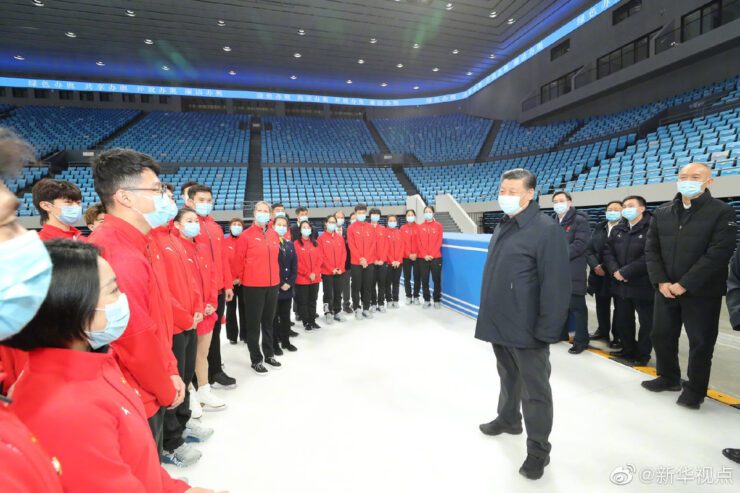
Before members of the International Olympic Committee in 2015 were to deliberate, discuss and vote on the host of the 2022 Winter Olympics, Chinese President Xi Jinping had said if the Games were held in China, they would be “fantastic, extraordinary and excellent.”
Seven years later, the Beijing Winter Olympics organizing committee is itself not sure whether it could be able to hold even a simple and safe Games or not. Starting on February 4, the Winter Olympics is just a few days away from now. To be hosted by Beijing, it will go on till February 20. As per South China Morning Post, the Olympics organizing committee now fears “cluster outbreaks will occur during the Games.”
Such concerns are emerging as China, despite following the world’s strictest “zero covid” policy with harsh lockdowns, is witnessing its cities like Xian in the midst of the worst epidemic. Chinese authorities officially said so far more than 200 cases have been detected in Xian city of 13 million residents. The city is in complete lockdown for several weeks. But those who are aware of past records of Beijing when attempts to fudge and dodge records surfaced in Wuhan, where the first Covid-19 case was reported in late 2019, they are skeptical about China’s official version on the status of Covid-19 cases.
However, before the Middle Kingdom could take stock of the situation arising from the new variant of Covid-19 called Omicron, another Chinese city Yuzhou in Henan province reported five confirmed positive cases, while 18 other asymptomatic cases. In the eastern city of Zhejiang, two Covid-19 symptomatic infections have been reported, while dense business areas like Shanghai city reported four Covid-19 asymptomatic cases. According to WHO, China has reported 133,404 confirmed symptomatic cases and 5699 deaths so far with Hubei province reporting maximum infections and deaths.
The sudden spurt in Covid-19 cases has, meanwhile, led to calling into question the effectiveness of China’s vaccines—Sinovac and Sinopharm—manufactured from killed SARS-CoV-2 virus. From Latin America to the Middle East to several Southeast Asian countries like Indonesia, Thailand, Philippines and Malaysia—have already questioned the efficacy of China-made vaccines against highly transmissible Covid-19 variants like Delta and Omicron. According to Nature, a weekly international journal, “studies have found that compared with vaccines made using other technologies, China’s inactivated vaccines initially generate lower levels of ‘neutralizing’ or ‘virus-blocking antibodies’—considered a proxy for protection—and that these levels drop quickly over time.”

More than this, what is worrying officials in charge of the epidemic control for the 2022 Beijing Winter Olympic and Paralympic organizing committee is infection’s presence around host locations—Beijing and Zhangjiakou cities and Yanqing district. They fear that if a well-guarded and the closed-loop management policy and strict coronavirus testing rules were not followed in cities where Omicron has already infected hundreds of people, there could be possibility the virus could sneak into Beijing and China would have to shelve the Winter Olympic and Paralympic Games.
This will be an embarrassing moment for China at the time when Western diplomats have already declared boycotts of the Beijing Winter Olympics. A flurry of diplomatic boycotts from several countries, including the US, the UK, Canada, Australia, New Zealand and Japan on account of widespread allegations of China’s human rights violations of people in Hong Kong, Xinjiang and Tibet have dented the significance of the Beijing Olympics.
For Chinese President Xi Jinping, however, the event is a matter of prestige. In his televised speech on New Year’s Eve, he had said: “We will spare no effort to present great games to the world. The world is turning its eyes to China, and China is ready” for the Olympics. The Chinese President, it is said, is keen to use the Olympics as a way to enhance national image which has suffered a huge battering because of the country’s approach towards Uyghur Muslims and Tibetans; its alleged role in the spread of coronavirus across the world; its disrespect for international laws in the South China Sea; its militaristic aggression against India, Taiwan and Japan.
A successful Olympics will also pave the way for smoothening Xi’s way to the third term as China’s supreme leader. At the end of 2022, the Communist Party of China will hold its National Congress, where Xi will be crowned for the third term. However, the irony is that when the Chinese President is taking a personal interest in the preparation for next month’s Olympics, North Korea, which is Beijing’s closest ally in the Korean Peninsula, has decided not to participate in the forthcoming Beijing Olympics and Paralympics. Pyongyang has cited the global spread of Covid-19 as the reason to skip the event. North Korea had also not sent a team to the Tokyo Olympics held in July-August 2021, citing the Coronavirus pandemic.
Although, China has said it will put in place stringent anti-Covid-19 measures during the Winter Olympics—by creating a “closed-loop systems,” also known as bubble—in which thousands of athletes, coaches, team officials, Olympic staff members, contractors, volunteers and journalists will be confined for the duration of the Games. The bubble will include event sites, hotels, media facilities and a transport network. No one will come in and no one will go out.
But still experts say these measures are not a foolproof guarantee of the safety of athletes, supporting staff members or those who will come to participate in the Games. This is the reason fears prevail among several countries on sending their players to the Beijing Winter Olympics. In Denmark, though, the government has not yet decided whether to send its team for the 2022 Winter Olympics or not, but there is broad consensus in the Danish Parliament that it would be a good idea to cancel the visit to Beijing.
All this is not a good sign. Instead, the Beijing Winter Olympics is staring at the same fate the Tokyo Summer Olympics saw in July-August-2021 when it turned out to be a TV-only event as fans were not allowed to see the games due to the surge in Covid-19 cases.
***The author is a senior journalist and commentator on foreign affairs








